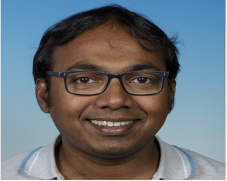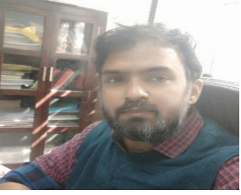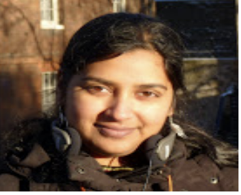Program:
Time | Speaker |
10.00 – 10.15 | Milind Gandhe About IIITB COMET Foundation and The Workshop |
10.15 – 10.30 | Shiva Kumar Malapaka Introduction to Various Aspects of Quantum Computing |
10.30 – 11.30 | Creation of Qubits and Quantum Computers Bodhaditya Santra Cold atom quantum technologies |
11.30 – 12.30 | Quantum Information Atul Kumar Quantum Information Processing and its potential Applications: An Overview |
2.00 – 3.00 | Application of Quantum Algorithms Jayasri DontaBhaktuni Hybrid Quantum machine learning (QML) methods – Use cases in Image classification |
3.00 – 3.20 | Ishu Gupta Quantum Machine Learning : Core Computer Science Applications |
3.40 – 4.10 | Sachin Punyani (Amazon Web Services) A Sneak Peek Into the Future with Quantum Computing and Its Use Cases |
4.10 – 4. 30 | Quantum Internet Shiva Kumar Malapaka / Dibakar Das Connectivity in Large Quantum Networks |
4.30 – 5.00 | B.Ashok Non-linear Oscillators & Adiabatic Quantum Computation & Summary and Concluding Remarks |
Detailed Contents:
Cold atom quantum technologies
Bodhaditya Santra
Department of Physics, Indian Institute of Technology Delhi
Understanding and applying physical laws of nature in the microscopic level has resulted the ground breaking discoveries of transistors and lasers. Such discoveries from the first quantum revolution has opened a new era of science and technology, which is ever growingly enabling our ability to control and manipulate quantum effects in a variety of many-body systems. The goal of the second quantum revolution, which is presently unfolding worldwide, is to establish state-of-the-art application domains which will facilitate quantum sensing, metrology, communication, computing and simulation. Development of these technologies requires top level research on basic science exploring the quantum coherence, superposition and entanglement. With the unprecedented controllability over various parameters, such as, tunnelling strength, interactions, level of disorder, cold atoms trapped in optical potentials provide a unique system for engineering the future quantum technologies. In this talk I will present the progress of our lab towards building Cesium atom based quantum devices such as quantum computer and quantum memories which are the building blocks of a quantum information processing network.
Quantum Information Processing and its potential Applications: An Overview
Atul Kumar
Indian Institute of Technology Jodhpur
During the last three decades, the field of quantum technology has received a lot of public attention, all due to the efforts from academia and industry to bring quantum information and computation at the verge of technology development. The fusion of fundamental laws of quantum mechanics with computing and information theory has led the path towards performing computation in the quantum realm. The significant development towards shifting the computing paradigm from classical to quantum- and from theory to technological implementation- can be attributed to groups of researchers across the globe and tech giants such as IBM, D-wave and Google among many others. The research and development in this field is indeed inspired from the inherent characteristics of quantum physics such as superposition principle, interference, non-classical correlations and quantum entanglement. Using these quantum phenomena, classically hard problems can be solved relatively quickly. One of the most fundamental differences between classical and quantum approach to computing is laid down in terms of quantum parallelism. The basic units of quantum computation are qubits which can be represented as an arbitrary linear superposition of orthonormal eigenstates of the property being measured. For an n qubit state, there are 2 n basis states which can be encoded and processes at once due to the superposition and linearity being the characteristic features of quantum mechanics- this leads to the concept of quantum parallelism which cannot be simulated by fastest of classical computers in polynomial time. On the implementation front, one needs to address issues of controlling, manipulating, scaling and accessing of quantum information. Nevertheless, there are tireless efforts to address these and many other technological challenges to put efficient developments on the pedestal of a fault-tolerant quantum computer. Clearly, entanglement and nonlocality are at the cornerstone of the basic premise of quantum information and computation. Although the applications of quantum information and computation promise to change the way we perform computation, one of the major bottlenecks in realizing a fault tolerant quantum computer is the inevitable interplay between quantum resources and environment leading to decoherence. A possible way out is quantum error correction but it further involves a large overhead in terms of number of qubits and gates involved. Therefore, one needs to find efficient mechanism to deal with the adverse effects of decoherence. In the Noisy-Intermediate Scale-Quantum (NISQ) era- where one may be dealing with a quantum computer with hundreds of qubits- there are several hybrid quantum classical algorithms of interest to machine learning and computational chemistry. Essentially both classical and quantum computation may coexist with their optimal utilization to tasks best suited for these technologies.
Hybrid Quantum machine learning (QML) methods – Use cases in Image classification
Jayasri Dontabhaktuni
Dept of Physics, Mahindra University, Hyderabad, India
Hybrid quantum machine learning (QML) methods are known to be very efficient compared to the classical ML methods. They require usage of smaller data sets and are less time consuming than their classical counterparts. In this talk I will discuss few quantum image representations discussed in the literature and elucidate on two use cases of image classification – MRI scans of brain tumour and underwater images taken by AUV’s to bring out the advantages of hybrid methods compared to their classical counterparts.
Speakers:

Bodhaditya Santra is an assistant professor of Physics at Indian Institute of Technology Delhi. His research group is building experiments to explore cold atom quantum technologies to address various problems in society and industry. He studied physics at the University of Burdwan, India and at the Indian Institute of Technology Kharagpur, India. In 2008, Bodhaditya joined the group of Dr. Lorenz Willmann/ Prof. Klaus Jungmann at the University of Groningen, Netherlands to work on laser spectroscopy of short lived radium atoms. In 2013 he received his PhD degree for the thesis work on “Precision spectroscopy of neutral radium: towards searches for permanent electric dipole moments”.
From 2013 to 2016 he worked as a postdoctoral research fellow in the group of Prof. Herwig Ott at the University of Kaiserslautern, Germany to study the microscopic dynamics of ultracold quantum gases in optical lattices. He used a scanning electron microscope to achieve high resolution imaging and single site addressability of Bose condensed rubidium atoms in optical lattices. In 2015, he received a grant from the University of Kaiserslautern to study the coherence dynamics of Bose-Einstein condensates in optical lattices.
From 2016 to 2018 he worked on ytterbium quantum gases in optical lattices in the group of Prof. Klaus Sengstock at the University of Hamburg, Germany. In this project he investigated many-body physics in SU(N) symmetric fermionic quantum systems using ytterbium optical lattice clock. From 2018 to 2019 he worked on quantum mixtures, dipolar molecules under a microscope and tunable quantum matter in optical lattices in Prof. Hanns-Christoph Nägerl’s group at the University of Innsbruck.

Dr. Atul Kumar is currently working as an Associate Professor in the department of chemistry at Indian Institute of Technology Jodhpur. As part of the Institute’s initiation to encourage Interdisciplinary Research Platforms (IDRP), I am also associated with IDRP Quantum Information and Computation as a Faculty member. I joined IIT Jodhpur as a Faculty member in March 2012. I completed my Ph.D. from Indian Institute of Technology Madras in May 2010 with the thesis entitled “Quantum Entanglement and Information Processing”. Since then, I am actively involved in teaching, research, outreach activities and administration. My research interests include Foundations of Quantum Theory, Classical and Quantum Correlations, Multiqubit Entanglement and Nonlocality, Quantum Communication protocols, and Quantum Computation in the realms of Quantum Chemistry

Dr. Jayasri Dontabhaktuni is Associate Professor in Department of Physics, Mahindra University. She obtained her Ph. D in Computational Physics from University of Hyderabad in 2009. She pursued her post-doctoral research with prestigious Marie Curie fellowship at University of Ljubljana, Slovenia during 2009-2011. She was selected for DST young scientist award (2012) and Dr. D. S. Kothari postdoctoral fellowship (2013) to further pursue her research in Computational Physics at University of Hyderabad. She is visiting researcher at Newton Institute of Mathematical Sciences, University of Cambridge (2019) and University of Ljubljana, Slovenia. She published more than 20 research articles in prestigious journals and presentations in number of international conferences (>40) across the world.
Dr. Dontabhaktuni is involved in teaching and research in Quantum Computing since 2019. She is the governing body member of Centre of Excellence in Quantum computing and Metaverse established as an MoU between Tech Mahindra (Makers lab) and MU. She has filed patents and published research in applications of quantum computing. She acted as resource person in faculty development programmes (FDP), acted as panel member and presented talks in various international conferences, academic organizations and industries. She is an invited member of QETCI, India. She holds an advanced certification in Quantum Computing algorithms and hardware from TU Delft with edX.